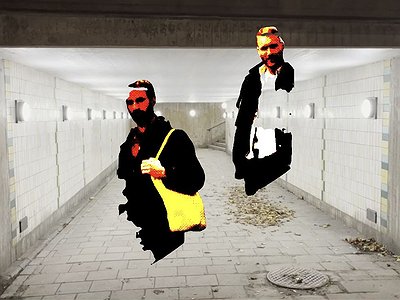Name: Portable Dogs
Members: Rupert Edwards and David Richardson
Interviewee: Rupert Edwards
Nationality: Australian (Rupert Edwards), British (David Richardson)
Occupation: Instrumentalists, composers, producers, improvisers
Current release: The new Portable Dogs 7inch Ads in Bed / Sleeping in the Vacuum is out via Maternal Voice.
When did you first start getting interested in musical improvisation?
Probably listening to the Velvet Underground as a teenager. There’re a few live recordings of “What Goes On” where Lou’s guitar is totally in the moment and absolutely bonkers.
Which artists, approaches, albums or performances involving prominent use of improvisation captured your imagination in the beginning?
There was a band called Footy that played a bit around Melbourne when I lived there.
They were two pianists, and I couldn’t tell which bits they were making up on the spot, and which bits were pre-written. It seemed mysterious and interesting!
Focusing on improvisation can be an incisive transition. Aside from musical considerations, there can also be personal motivations for looking for alternatives. Was this the case for you, and if so, in which way?
When Dave and I started playing together, we tried working with songs that either of us had come up with beforehand, but things felt much more alive and fun when we started winging it.
I suppose this was the personal motivation, i.e, for both of us to be having fun with it.
What, would you say, are the key ideas behind your approach to improvisation? Do you see yourself as part of a tradition or historic lineage?
The key idea is pleasure! I have nice memories of recording our first tape at a small practice space in Stockholm, when we’d more or less abandoned the idea of doing pre-written music, and having no idea what we were doing. But having a blast.
What was your own learning curve / creative development like when it comes to improvisation - what were challenges and breakthroughs?
The challenge is always the same for me: to not think too much.
Tell me about your instrument and/or tools, please. How would you describe the relationship with it? What are its most important qualities and how do they influence the musical results and your own performance?
Dave is a really good bass player, but I am absolutely appalling in the technical sense when it comes to synths and drum machines.
For me, one of the weirdly pleasing things about the Portable Dogs 7” , is that I’m not even trying to use the synth in a “normal” way.
I don’t even know what I was doing when I listen to it now, which is probably a good thing, cause it means I can’t repeat it.
How do you feel your sense of identity influences your collaborations? Do you feel as though you are able to express yourself more fully in solo mode or, conversely, through the interaction with other musicians? Are you “gaining” or “sacrificing” something in a collaboration?
I absolutely gain something through working with other people. It’s so much more interesting when there are other people around.
I’ve always wondered how solo artists do it.
To you, are there rules in improvisation? If so, what kind of rules are these?
I feel like there are rules but I can’t name them. I’d be trying to break them if I could find them.
There are many descriptions of the ideal state of mind for being creative. What is it like for you? In which way is it different between your solo work and collaborations?
Coming along to things without a pre-prepared idea of how things should sound is always good.
The things we throw in the bin are always the ones where I’m telling myself something like “do something Yellow Magic Orchestra”.
How do you see the relationship between sound, space and performance and what are some of your strategies and approaches of working with them?
We recorded the 7” in an underground, windowless practise space during winter a little while back, and I think that freezing, insular vibe of a Swedish winter seeped into things somehow.
In a way, improvisations remind us of the transitory nature of life. What, do you feel, can music and improvisation express and reveal about life and death?
Woah, good question. I think traditionally written songs become nailed down to a certain time and place, which can be wonderful actually, but the stuff Dave and I make up on the spot together seems to evaporate as soon as we record it. I often have no memory of what we make up until I hear it played back, which I actually really like.
Does this say something about life and death? God, maybe.




